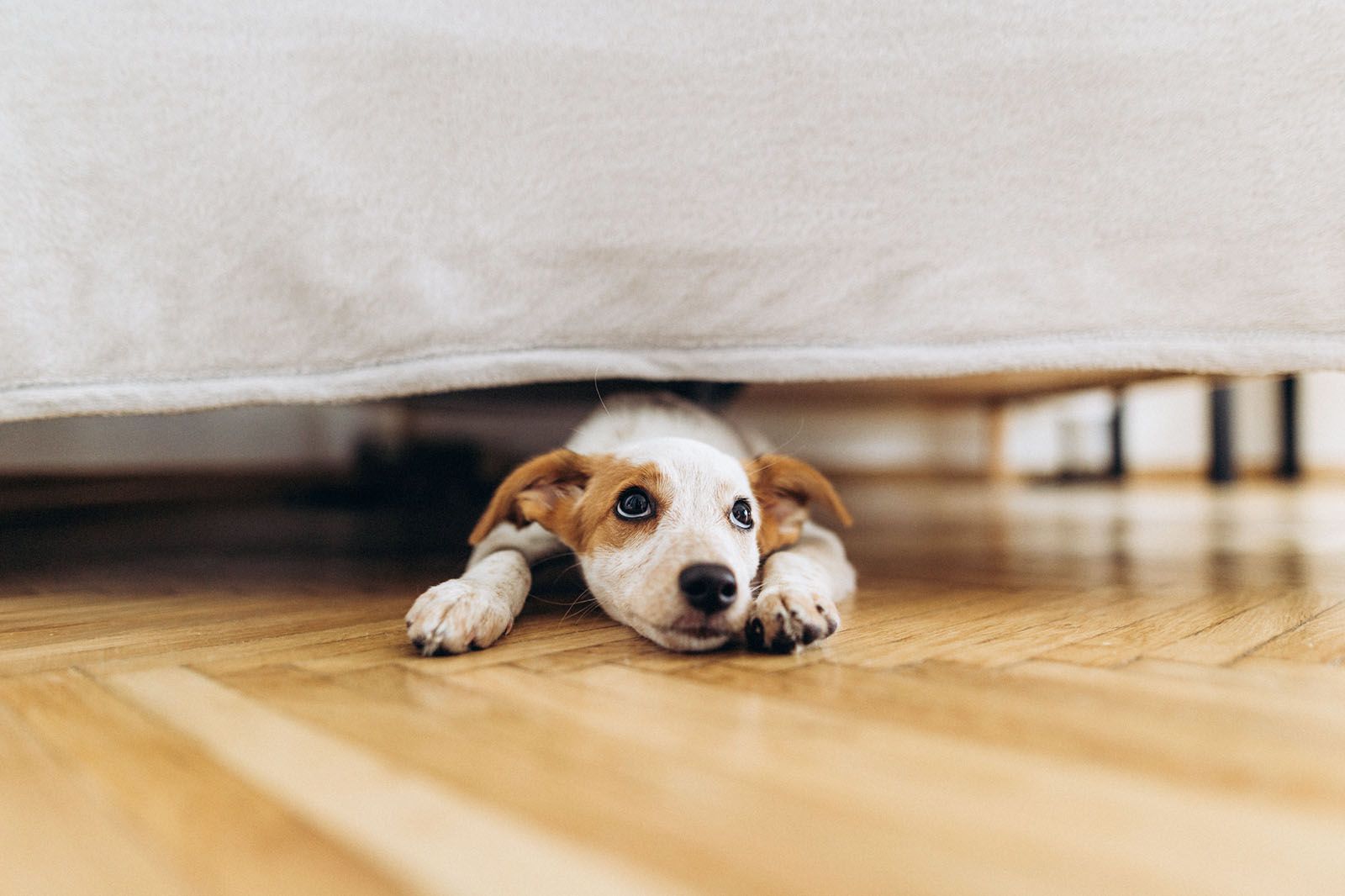Many dog owners have experienced their furry friends sleeping under their beds. While this behavior can be cute and endearing, it can also leave pet owners wondering why their dogs prefer this spot. There are a few potential reasons why dogs choose to sleep under beds, and understanding these reasons can help owners better care for their pets.

One reason why dogs may sleep under beds is that they instinctually seek out enclosed areas where they feel secure. In the wild, dogs create small dens to sleep and raise their pups. In a domestic setting, the dark, warm space beneath a bed can serve as an ideal spot for dogs to make their den. Additionally, sleeping under a bed allows dogs to see from all angles, providing a sense of security. The space under a bed is also enclosed from above, which increases a dog's sense of security, allowing them to feel safe and protected.
Another reason why dogs may sleep under beds is that they are anxious, ill, or in pain. In these cases, dogs may seek comfort by retreating under a bed. Noise phobias can also cause dogs to find somewhere safe, and if a dog has only recently started retreating under the bed and shows other symptoms, it may be worth speaking to a veterinarian. Understanding why dogs sleep under beds can help owners provide a comfortable and safe environment for their furry friends.

Understanding Dog Behavior
Dogs are social animals and have a range of behaviors that can be influenced by their environment and upbringing. Understanding dog behavior is crucial to maintaining a healthy and happy relationship with your pet.
Sleeping Habits
Dogs have different sleeping habits than humans. They tend to sleep in short bursts throughout the day, rather than in one long period at night. Dogs also have a natural instinct to seek out enclosed spaces to sleep in, such as dens or caves. This is why some dogs may choose to sleep under the bed.
Destructive Behavior
Dogs may exhibit destructive behavior for a variety of reasons, including boredom, anxiety, or lack of exercise. If your dog is exhibiting destructive behavior, it is important to identify the root cause and address it through training or environmental changes.
Positive Reinforcement
Positive reinforcement is a powerful tool in dog training. It involves rewarding your dog for desired behaviors, rather than punishing them for unwanted behaviors. This approach can help build a strong bond between you and your dog, and encourage them to continue exhibiting good behavior.
Overall, understanding dog behavior is an important part of being a responsible pet owner. By learning about your dog's sleeping habits, destructive behavior, and positive reinforcement, you can build a strong and healthy relationship with your furry friend.

Health and Comfort Factors
Dogs are creatures of comfort and often seek out cozy, warm places to rest. Sleeping under the bed can provide a sense of security and comfort for dogs. However, there are also health factors to consider when it comes to your dog's sleeping habits.
Temperature and Warmth
Dogs are sensitive to temperature and often seek out warm places to sleep. Sleeping under the bed can provide a cozy and warm environment for your dog. However, it's important to ensure that the temperature under the bed is not too hot or too cold. Dogs can overheat or become too cold, which can lead to health problems.
Food and Nutrition
A dog's diet can affect their sleeping habits. If your dog is not getting enough nutrients or is eating an unhealthy diet, they may seek out comfort in sleeping under the bed. It's important to provide your dog with a balanced and nutritious diet to ensure they are healthy and comfortable.
Dog Bed Comfort
If your dog is sleeping under the bed instead of on their designated dog bed, it may be a sign that their bed is uncomfortable or not providing enough support. Ensure that your dog's bed is comfortable and provides adequate support for their joints and body.
Overall, while sleeping under the bed can provide comfort and security for your dog, it's important to consider the health factors involved. Ensure that the temperature is appropriate, provide a balanced diet, and ensure that your dog's bed is comfortable and supportive.

Anxiety and Fear in Dogs
Dogs can experience anxiety and fear, just like humans. Anxiety in dogs can manifest in various ways, including excessive barking, destructive behavior, and hiding under furniture such as beds. Fear in dogs can be caused by loud noises, unfamiliar people or animals, and visual stimuli like hats or sunglasses.
Separation Anxiety
Separation anxiety is a common form of anxiety in dogs. It occurs when dogs become distressed when left alone or separated from their owners. Dogs with separation anxiety may exhibit destructive behavior, excessive barking, and house soiling. They may also try to escape by digging or chewing through doors and windows.
Fear and Loud Noises
Loud noises such as thunder, fireworks, and construction can trigger fear in dogs. Dogs may become anxious, agitated, and may try to hide under furniture such as beds. Some dogs may also become destructive and may try to escape.
It is important to understand that anxiety and fear in dogs can be managed and treated. Pet owners can seek the help of a veterinarian or professional dog trainer to help manage their dog's anxiety and fear. Ensuring that dogs get enough physical activity, including familiar items like their bed or toys, and regular vet check-ups can also help rule out underlying health concerns.

Dealing with the Behavior
If a dog's habit of sleeping under the bed is causing problems, there are several ways to address the behavior.
Crate Training
One option is to crate train the dog. This involves teaching the dog to associate the crate with a safe and comfortable space. A crate can provide a dog with a sense of security, and can also be a useful tool for managing behavior when the owner is not home. However, it is important to note that crate training should be done properly and with care, as improper use of a crate can be harmful to the dog.
Consulting a Veterinarian
If the behavior seems to be related to an illness or anxiety, it may be necessary to consult a veterinarian. Dogs may sleep under the bed due to anxiety caused by loud noises or changes in the environment, or due to illness. A veterinarian can help identify any underlying health issues and provide guidance on how to address them.
Environmental Changes
In some cases, environmental changes may be necessary to discourage the behavior. For example, if the dog is sleeping under the bed to stay cool during the summer months, providing a cool and comfortable alternative sleeping area may help. Alternatively, if the dog is seeking privacy or a sense of security, providing a cozy dog bed in a quiet area of the home may be helpful.
It is important to avoid encouraging the behavior, as this can reinforce it and make it more difficult to change. With patience and consistency, it is possible to modify a dog's sleeping habits and provide them with a safe and comfortable sleeping space.